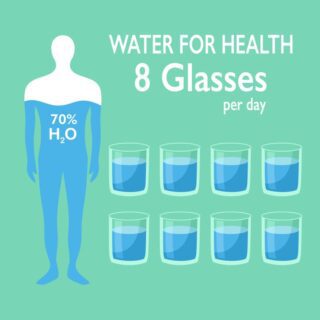How much water am I really supposed to drink?

Water is an essential nutrient. Drinking an adequate amount of water is very important, but exactly how much water are you really supposed to be drinking every day in order to reap the benefits of reducing health problems and preventing disease? Fluid intake recommendations vary across the globe and span from 1500 to 2200 mL for women and 1500 to 3000 mL for men (Nutrition Today, 2020). This is equal to 6.3 to 9.3 cups for women and 6.3 to 12.7 cups for men. In other research, it is noted that the “ordinary standard” of water for adults is 1 mL for each calorie of food (Elsevier, 2020). So, if an individual consumes 2000 calories per day, he or she should drink about 8 cups of water.
In reality, water intake differs for everyone. Extra water is warranted in certain situations based on individual needs. Here are a few of those situations:
- For individuals trying to lose weight, drinking more water leads to consumption of fewer calories. Specifically, it was shown that drinking 2 cups of water prior to a meal resulted in substantial weight loss and greater fat oxidation (Nutrition Today, 2020).
- For individuals prone to kidney stone formation, increased water intake has been shown to prevent recurrence (Nutrition Today, 2020).
- For women prone to urinary tract infections, increased water intake has been shown to reduce incidence by half (Elsevier, 2020). Generally, though, fluid intake for this group was already low.
It is important to note, though, that drinking too much water may be more problematic than not drinking enough. Hyponatremia is a common result of drinking too much water, and is commonly associated with illnesses such as kidney disease or taking medications such as diuretics. In healthy individuals, hyponatremia is caused by water intoxication, or drinking water in too large of quantities. In extreme athletes who already have depleted sodium reserves due to their intense physical exertion, these results may even be fatal (Elsevier, 2020).
Hydration, being as important as it is, seems to complicate itself. When tackling the decision of exactly how much water to consume, remember this: your body has a signaling system that alerts you to hydrate long before you actually become dehydrated. Listen to your body and adjust your water intake based on the above recommendations. For older individuals, consider decreasing water intake in the evening. This will avoid nighttime urination and increased opportunity for falling when getting out of bed during the night.

This article reviewed by Dr. Jim Liu, MD and Ms. Deb Dooley, APRN.
There’s nothing more important than our good health – that’s our principal capital asset.
#medical #telehealth #umedoc










